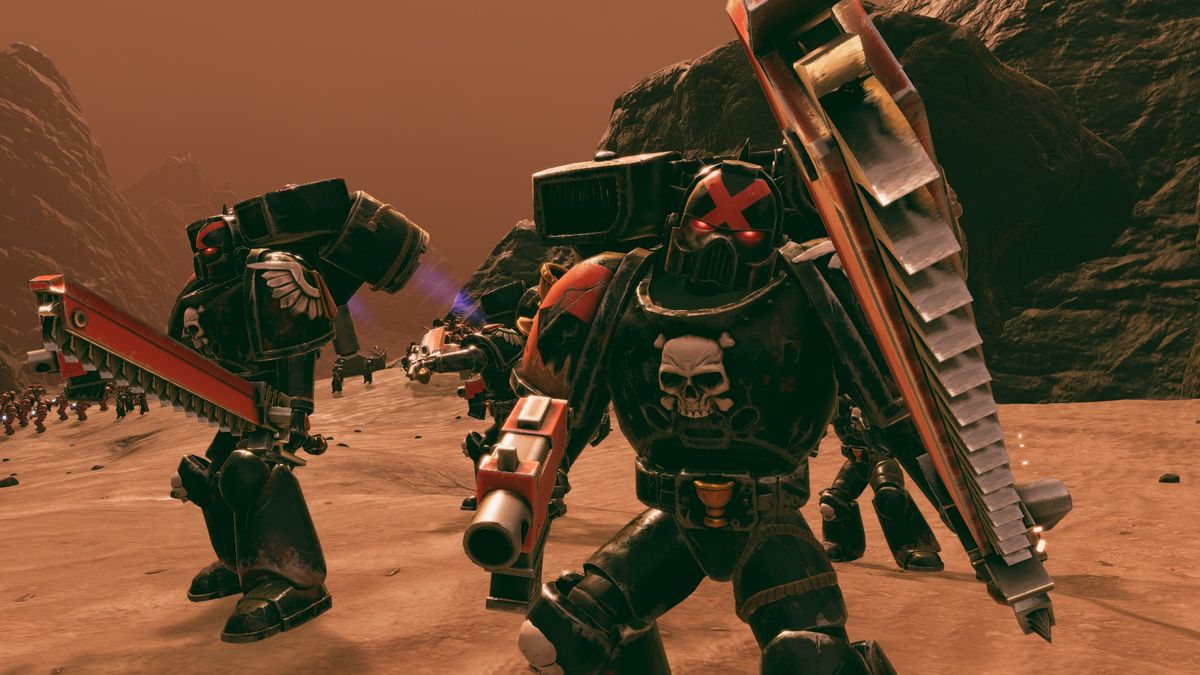Our Verdict
A better Warhammer game than the last few.
PC Gamer's got your back
What is it? Battle-scale turn-based tactics in the 41st millennium
Expect to pay: $50/£32
Developer: Black Lab Games
Publisher: Slitherine
Reviewed on: Windows 10, Intel Core i7, 16GB RAM, Nvidia GTX 1060
Multiplayer: Two-player online, hot-seat, PBEM
Out: July 22
Link: Official site
Warhammer 40,000: Battlesector is turn-based and about space marines, which means it'll rile up those who want more 40K games to be real-time and action-packed, as well as those who are sick of every 40K game being about space marines. Thing is, the last 18 months have given us games about the setting's bounty hunters, giant robots, punk gangs, fighter planes, and fighter planes but with orks. Thank Games Workshop's free-and-easy licensing for the variety, which is why I'm fine with Battlesector reprising one of the more classic themes.
I'm also fine with it being turn-based, because I remember the days when every 40K game was real-time and we complained about that instead. For everything there is a season. It's a little-known fact that when The Byrds sang Turn! Turn! Turn! they were actually singing about turn-based strategy.
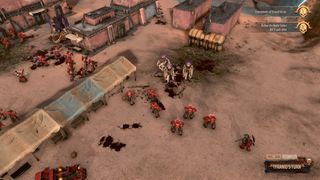
Battlesector isn't purely about marines. You can play the dinobug alien tyranids in skirmish mode or multiplayer—online or hot-seat or even over email—and in the singleplayer campaign you unlock a handful of Sisters of Battle to join your army. (The space marines are the setting's warrior monks, the Sisters of Battle are its warrior nuns.) Plus, Battlesector isn't about generic armored lummoxes, but one of the more interesting flavors of space marine: the Blood Angels, who are the space marines you get into if you watched Hammer horror movies when you were young. One of their codex books even has Christopher Lee on the cover.
The Blood Angels suffer from an affliction called Red Thirst, which makes them literally and figuratively bloodthirsty. In Battlesector this means they get more momentum points, which are normally earned for kills, the closer they are to enemies. When a unit gets 100 momentum points they begin "surging", gaining a movement bonus and the option to trade in those points for an extra action or a single empowered use of an ability.
Non-marines earn bonus momentum points in ways that play to their personality too. The hive-minded tyranids score more if one of their queen-bee synaptic leaders is within range, encouraging them to move in clustered swarms, while the Sisters of Battle earn momentum for taking damage as well as dealing it, like the masochistic martyrs they are.
At first momentum doesn't seem like a big deal, but as armies get bigger there are more opportunities to rack up huge amounts over the course of a level. Its effect on some of the late-game skills is dramatic too. My psyker, whose ability to create an image of a real scary face sounded kind of underwhelming, used an empowered version of that to drop six close-grouped tyranid units at once.
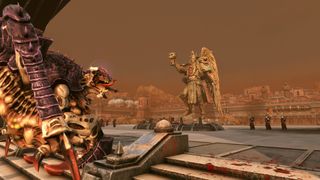
It's tempting in games like this to go into overwatch on every turn, and overwatch can be powerful in Battlesector. To emphasize that, it drops into slow-motion so you can see every shot go off and all the numbers flying out. But activating overwatch costs momentum, which pushes you to be sparing with it and instead commit to risky advances, getting your commander with the jump pack and thunder hammer leaping into hand-to-hand with some giant monster that gives birth to swarms of smaller enemies or vomits acid.
The other thing that discourages hanging back is that cover can be unpredictable. Sometimes a unit behind cover can shoot through it without penalty, but then at other times it blocks them and you'll try to shoot down from a gangplank only to hit the railing with every bullet.
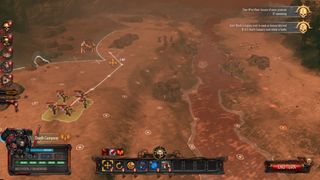
The Blood Angels' curse is double-pronged. As well as the constant Red Thirst there's the rarer Black Rage. Those it descends on spiral toward a berserk state that'll eventually kill them. They paint their armor black and form a separate unit, a Death Company who take on dangerous missions in the hope they'll die doing something valiant. The first time you see a Death Company in Battlesector's campaign, they're engaged in a fight that's been going for days, swinging chainswords while knee-deep in a river of blood. Your bonus objective in this mission is to help five of their units die.
In moments like this, Battlesector is goth as hell. It takes place on a moon covered in red deserts, ruined cathedrals, and factories whose main item of production is apparently giant statues holding goblets shaped like skulls. Between missions your HQ units narrate with tough-guy lyricism, saying things like, "On this hallowed ground, every one of us fought with tooth and bloody nail for the chance to become angels." (Only the techmarine Croginax is more prosaic, crankily muttering, "That's enough poetics from you.") It's a vivid portrayal, one that benefits from familiarity with Warhammer 40,000.
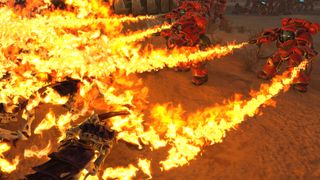
The story also expects you're up to date with the unfolding metaplot of 40K's recent years, throwing around names like "Archmagos Cawl" and "Indomitus Crusade". An opening cutscene explains the basics, and why there are newly created primaris marines—even more transhuman than the regular variety—joining you for their first taste of battle. But if you haven't read the books or played the tabletop game lately, you'll have some catching up to do.
Though the campaign's opening act is ostensibly about the old firstborn marines making peace with their even more bulked-up replacements, the primaris don't really get to talk. Their presence is felt in battles rather than between them, which meant I never really connected to the overarching story linking it all together. Much as I enjoyed the tactical play—responding to venomthropes who fart poison into the ground by sending in tanks who don't give a damn about it, or spacing units so they could shoot from the range their guns were most effective at—the connective tissue of its superstructure didn't click for me.
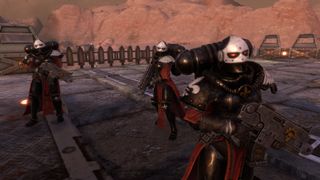
That's not just because the story kept me at a distance, but because units are entirely replaceable. While HQ units have skill trees, a squad that's been with you from the beginning is the same as the limitless fresh ones you can pick. There's so much character in the rest of the game, it's odd to find it missing here. Plus, the Blood Angels lend themselves to a progression system, veteran units getting tougher but potentially succumbing to the Black Rage each time they're used. In Battlesector, the Death Company is just an option you select if you've got enough points for them.
Meanwhile, the points limit of each battle is a number you only learn after you've left the army management screen, which means either going back to edit your list after the pre-battle narration has begun, or having to delete excess squads to get the math right while you're choosing where to deploy them.
That's kind of a quibble, and while I've got a few more of those—I got sick of hearing the same tyranid screams over and over, and of hunting for the last enemies on each map after completing the main objective—this is still a thumbs up. Battlesector is an evocative take on 40K, and a pacey tactics game that sometimes made me scratch my chin and consider flanking manoeuvres, and sometimes made me go "fuck it", activate the jump packs and spin up the chainswords.
A better Warhammer game than the last few.

Jody's first computer was a Commodore 64, so he remembers having to use a code wheel to play Pool of Radiance. A former music journalist who interviewed everyone from Giorgio Moroder to Trent Reznor, Jody also co-hosted Australia's first radio show about videogames, Zed Games. He's written for Rock Paper Shotgun, The Big Issue, GamesRadar, Zam, Glixel, Five Out of Ten Magazine, and Playboy.com, whose cheques with the bunny logo made for fun conversations at the bank. Jody's first article for PC Gamer was about the audio of Alien Isolation, published in 2015, and since then he's written about why Silent Hill belongs on PC, why Recettear: An Item Shop's Tale is the best fantasy shopkeeper tycoon game, and how weird Lost Ark can get. Jody edited PC Gamer Indie from 2017 to 2018, and he eventually lived up to his promise to play every Warhammer videogame.

I paid money to drive a real car that filled up with fumes when I didn't pump the pedal, and it's all because I loved Jalopy

The Royal Shakespeare Company has announced a Her Story-like game where you hack into Lady MacBeth's computer

Celeste developer starts 2025 with a 'huge, heartbreaking, and yet relieving failure' as creative difficulties and internal conflict lead to the cancellation of Earthblade
